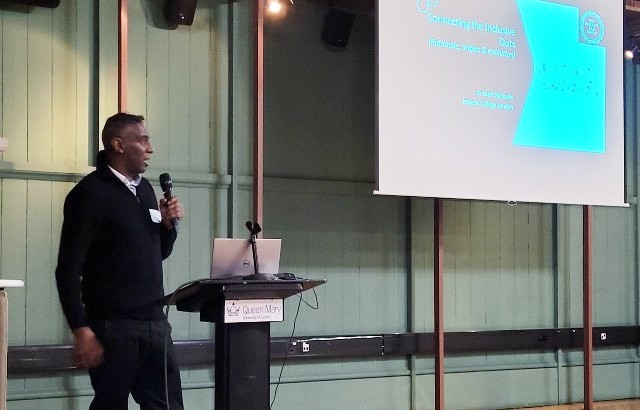Queen Mary's new Centre for Academic Inclusion in Science and Engineering (CAISE) sets out to champion inclusive education
CAISE aims to ensure all students have an equal opportunity to become scientists and engineers.

Dr Mark Richards speaking on 'Connecting the Inclusive Dots'
Set up by Queen Mary's Faculty of Science and Engineering, CAISE is a direct response to the university's Strategy 2030, and its objective to be most inclusive university of our kind. Working across the faculty's five schools, CAISE will work to ensure that not only our curriculum is inclusive, but that students at the faculty are supported equally throughout their academic and career development. It will use an evidence-led, intersectional and interdisciplinary approach.
CAISE Director Dr Gabriel Cavalli said: “We will go above and beyond standard methods to implement an inclusive curriculum, to reduce awarding gaps and to improve retention and progression. The focus of CAISE is to embed disciplinary literacies and practice in the curriculum, i.e. Thinking like a Scientist and Engineering Judgement. It will support our academics to be better and more inclusive educators.
Data has shown, for example, that these invisible barriers, such as the use of expert jargon – or 'STEMglish' – disproportionately affects minoritised groups.
We will also consider how to better support students undergoing mental health issues, as well as neurodiverse students, building on the excellent work on neurodiversity championed by the Queen Mary Academy.
Professor Wen Wang, Queen Mary's Vice-Principal and Executive Dean for Science and Engineering, said: “The Centre for Academic Inclusion in Science and Engineering at Queen Mary addresses the University’s Mission as expressed in our ambitious Strategy 2030: To create a truly inclusive environment, building on our cherished cultural diversity, where students and staff flourish, reach their full potential and are proud to be part of the University. I am proud that we are doing this collectively in a collegial manner, with contributions from all Schools across the Faculty of Science and Engineering, the Queen Mary Academy, and colleagues in the Faculty of Humanity and Social Sciences and the Faculty of Medicine and Dentistry.”
Dr Cavalli and CAISE Deputy Directors Dr Folashade Akinmolayan-Taiwo and Dr Marie-Luce Bourguet will lead the development and implementation of the centre's activities. They will be supported by an Advisory Board, chaired by Prof Henri Huijberts, Deputy Dean for Education in the Faculty of Science & Engineering, with representation from across Queen Mary's Faculties (Medicine and Dentistry and Humanities and Social Sciences), the Queen Mary Academy, and a wide range of external organisations championing equality, diversity and inclusion in STEM.
The Centre was launched at an event in Queen Mary's Octagon theatre. More than 100 guests attended, including members of the British Science Association, and leading scholars in Inclusive Education in STEM in Higher Education. Topics discussed varied from diversifying the curriculum, decoding STEM thinking for learners, teaching inclusivity to students, staff development for inclusive education, and STEM education and scholarship. Dr Mark Richards, a Senior Teaching Fellow at Imperial College's Department of Physics and a member of CAISE's Advisory Board, gave a talk titled 'Connecting the Inclusive Dots'. Queen Mary's Principal Colin Bailey also reflected on his own path into HE through an apprenticeship,
CAISE's work will be integrated into all of the five schools in the faculty, and people already championing this activity will be members. Its outputs will be focused on science and engineering, but its methods will be interdisciplinary.
'These are issues that lie outside the expertise of academics in science and engineering,' said Dr Cavalli, 'therefore, we will work across the disciplines with colleagues from the social sciences and more widely and strive to understand learners' experiences to address these issues.'
Related items

9 December 2024

28 November 2024
